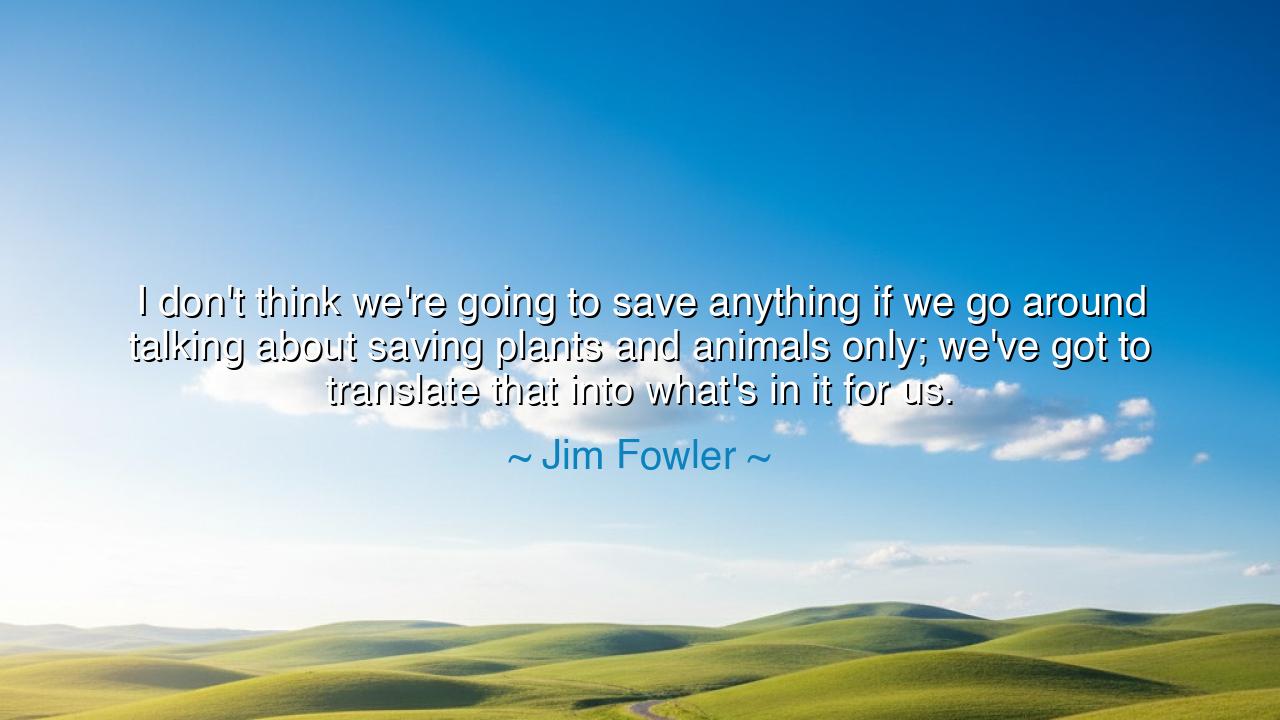
I don't think we're going to save anything if we go around
I don't think we're going to save anything if we go around talking about saving plants and animals only; we've got to translate that into what's in it for us.






In a voice trimmed to the bone, Jim Fowler says: “I don’t think we’re going to save anything if we go around talking about saving plants and animals only; we’ve got to translate that into what’s in it for us.” Hear the candor and the strategy. He doesn’t belittle love for wild things; he insists that love must learn the grammar of human need. People move when they feel the tug of bread, breath, and belonging. A message that stops at pity for creatures may warm the heart; a message that shows how those creatures keep our water sweet, our crops fruitful, our lungs unburdened—this moves the hands, the budgets, the laws.
The ancients would call this the discipline of persuasion: speak to the good that people already recognize. To translate the value of a wetland into flood protection, of a forest into rainfall and rain-holding soil, of a reef into fish on the table and waves gentled at the shore—this is not cynical; it is accurate. The world is jointed; our fortunes are braided with the fates of other beings. We do not cheapen the heron by noting that its marsh stores carbon; we honor the marsh twice—first for beauty, then for service.
Consider a lamp from history. Along the coasts of the Bay of Bengal, villages shielded by intact mangroves have repeatedly fared better in cyclones than those fronted by bare mudflats. The mangrove is not only cathedral—buttressed trunks, sacred hush—it is also wall and sponge: it knocks the anger from waves, slows surge, traps silt, breeds fish. When leaders framed mangrove restoration as storm insurance and livelihood—not merely as “saving trees”—plantings multiplied, budgets followed, and lives were kept. Here Fowler’s counsel took on bark and leaf: speak what’s in it for us, and the forest stands a chance.
Another lamp: where pollinators falter, farmers count the losses in fruit and seed, not just in missing beesong. Communities that rewove hedgerows, diversified field edges, and reduced pesticide blasts did so not only out of sentiment for wings, but because yields rose and risk fell. The swallow’s arc and the ledger’s arc bent together. By linking orchard income to the health of the flying nations, neighbors became guardians of bloom times and nesting hollows. Again, the wild was saved by telling the truth about benefits that return to the human hearth.
Fowler’s origin is the field naturalist’s school: decades of watching how people actually change. He learned that a poster of a rare cat rarely shifts a policy, but a spreadsheet showing how that cat’s forest keeps a city’s aquifer alive might. He knew that a child thrilled by a hawk becomes an adult who votes for clean air—if someone connects the thrill to asthma rates, to hospital bills, to the taste of a morning run. In this sense, saving plants and animals is not replaced; it is reframed as saving the conditions that let human dignity breathe.
The lesson is not to trade wonder for accounting; it is to wed them. Lead with awe; close with arithmetic. Say: this river is home to salmon and myth—and its cool flow trims the power bill in summer, props the tourist trade, steadies property values against flood. Say: this prairie holds larks and light—and the deep roots bank carbon, the native grasses endure droughts that wither lawns, the soil armored by those roots stays in the county instead of in the gulf. Thus we translate beauty into policy without losing the music.
What, then, shall we do? In our towns, price ecosystem services openly—water filtration, flood buffering, pollination—so budgets can see what eyes already love. In our schools, teach the two languages of care: the poetry of belonging and the prose of outcomes. In our businesses, choose procurement that rewards landscapes which feed both cranes and children. In our lives, tell the fuller story whenever we can: that a marsh is also a shield, a bee a farmhand, a tree a quiet worker of rain and shade. Do this, and Fowler’s hard wisdom will become a bridge: from sentiment to stewardship, from posters to policies, from fragile symbols to durable covenants with the living world—for us, and for everything that breathes beside us.






AAdministratorAdministrator
Welcome, honored guests. Please leave a comment, we will respond soon